|
|
Original Problems (page 2)I’ll publish some of my problems here and I’d be happy to receive yours! Diagrams, comments, new ideas, anything to discuss – are very appreciated! The site is mostly about fairies, but h# and s# are also welcome! Please send your problems to my e-mail: julia@juliasfairies.com Go to >>> Page 1 ; >>> Page 3 |
Let me show you 4 originals here.
The first two of them are my own – in the both cases I use a special nature of the pieces to create reciprocal batteries:
No.5 – neutral Locusts as a battery pieces;
No.6 – neutral and white chameleons as a battery pieces.
And it’s a honor for me to publish here the another two originals – the both by famous composer Petko A.Petkov:
No.7, No.8 – rich thematic complexes with KoBul Chess.
Definitions:
Locust (L): moves on Q-lines but only by capturing an enemy unit, arriving on the square immediately beyond that unit, which must be vacant.
Rook-Locust (LR): Moves like Locust, but on Rook-lines only.
Bishop-Locust (LB): Moves like Locust, but on Bishop-lines only.
Chameleon: On completing a move, a Chameleon (from classical standard type) changes into another piece, in the sequence Q-S-B-R-Q… Promotion may be to a chameleon at any stage in the cycle.
KoBul Kings – When a piece (not a pawn) of his own side is captured, a King transforms into a Royal piece of the same type as the captured one. When the King is in the form of any Royal piece and there is a capture of one of the pawns of his own side, he becomes a normal King again. Сaptures are illegal if their result is self-cheсk because of the transformation of the Кings according to KoBul rules. Castling is allowed only if the KoBul King is on his initial square in the form of a normal King and if he has not already moved; however he may already have been transformed. In the case of capture by a King in AntiCirce he is reborn on his initial square and may castle. If the capture is by a King which is in the form of some Royal piece, he is reborn on the initial square of that piece (the definition from www.kobulchess.com). The perfect examples of KoBul Kings you can see in the Award of KoBulChess TT 2012.
|
–
No.5 Julia Vysotska
(Latvia)
original
–
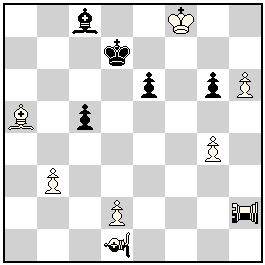 h#2 b) pc5->d6 (6+5+2)
Neutral Bishop Locust d1
Neutral Rook Locust h2
–
a) 1.nRL×d2-c2 nRL×c5-c6 2.nBL×b3-a4 nRL×e6-f6#
b) 1.nBL×g4-h5 nBL×g6-f7 2.nRL×h6-h7 nBL×e6-d5#
–
Creation of reciprocal batteries nRL/nBL and nBL/nRL. The neutral Locust can’t go back to the battery-line because of its nature – it has no hurdle anymore after the 2nd move. My idea was to demonstrate this theme, showing maximal activity of the both neutral Locusts which make all possible 4 half-moves in each solution. (Author)
|
–
No.6 Julia Vysotska
(Latvia)
original
–
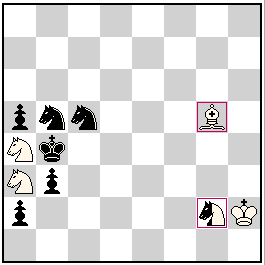 h#2 2 solutions (4+6+1)
Neutral Chameleon Sg2
White Chameleon Bg5
–
I. 1.Sxa3 cBh4=cR + 2.ncSf4=ncB + ncBb8=ncR #
II. 1.Sxa4 cBd2=cR 2.ncSe1=ncB cRd6=cQ #
–
Reciprocal creation of mixed-color batteries between Chameleons. Captures of the white Ss combined with black self-blocks and line-opening. (Author)
|
|
–
No.7 Petko A.Petkov
(Bulgaria)
original
–
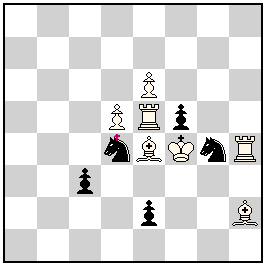 h#2 2 solutions (7+5)
KoBul Kings
Royal Sd4
–
I.1.Se3! Re5xf5 (=bKd4) 2.Kxe4 (=wrB)+! rBxe3(= brSe4)#
II. 1.Sf2! Bxf5 (=bKd4) 2.Kxe5 (=wrR)+! rRf4xf2(=brSe5)#
–
In every solution after double transformations of King`s pieces and cross-checks follow double creation of white batteries: one direct and one indirect with interesting nuance – these batteries have a common forward piece – white Kobul King respectively in B and R phases. Interchange of functions is demonstrated so: I solution : direct white KBf4/Rh4 and indirect white KBf4/Bh2; in II solution : direct white KRf4/Bh2 and indirect white KRf4/Rh4. Key-moves of black S are thematic sacrifices and open masced line by the white Rh4. (Author)
|
–
No.8 Petko A.Petkov
(Bulgaria)
original
–
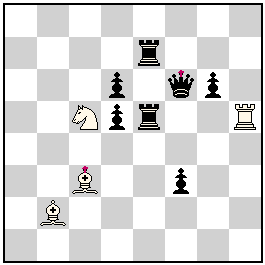 h#2* (4+7)
KoBul Kings
Royal: white Bc3, black Qe5
–
Set-play: 1…Rg5! 2.Rxg5 (=rwRc3)+ rRxf3(=bKf6)#
Real play: 1.Rf7! Se6!! 2.Rxe6 (=wrSc3)+ rSxd5(=bKf6)#
–
Surprising white sacrifices on g5/e6 with goal: unpin of black Re5 which is pinned in initial position from the wrBc3. and sellf-blocks on g5/e6. After Re5 moves we have duel between the black battery R/rQf6 and white battery rBc3/Bb2 with cross-checks as additional motive and transformation of rQf6 in K-phase. Interesting is that Black cannot tgempo-move in the initial setting because after the try 1.f2? White cannot transform black rQ in K phase with non-capturing move 2…rRf3+? (Author)
|
The diagrams are made on WinChloe and it’s Echecs font is used for Logo design.


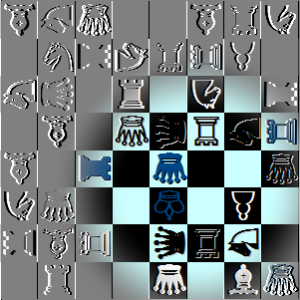
Nice Reciprocal batteries. Neat use of Neutral Locusts to give single check mates, rather than double check which is a must for other neutral battery mates!
At cost of one piece the following position is in the two-solution form and with model mates (if I’m not mistaken), although the first move is not made by neutral locust(s), but by neutral knight:
Author Julia Vysotska
Origin version JL
Stipulation h#2.5
Remark 2.1.1.1.1
Pieces
White Kg8 Pe7 Pg6 Pb5 Pa3 LRa1
Black Pf4 Pb3 Pd3 Pg3 Ke2
Neutral LBe8 LRa7 Sd6
1…nSd6-e4 2.nLRa7*e7-f7 nLRf7*f4-f3 3.nLBe8*g6-h5 nLRf3*d3-c3 #
1…nSd6-f5 2.nLBe8*b5-a4 nLBa4*b3-c2 3.nLRa7*a3-a2 nLBc2*d3-e4 #
There is still some hidden potential in the scheme.
Dear Juraj,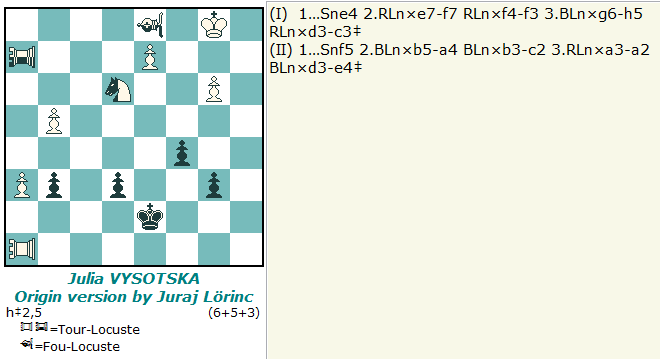
Thank you for your version!! I like the idea to make h#2.5.
I’ve put your notation on the diagram – for everyone to see it:
But the moves of the neutral S here in the both solutions are like white moves. I’ve tried to change it to the white S, but there’s one cook then. But is it right to use a neutral piece in such case? Thanks! Julia
That is difficult question and the answer depends on individual preferences in my view. Some people prefer using as little fairy pieces as possible in the problem. Others (including me) treat fairy elements as normal available constructional material if they are needed for the core of mechanism. Here neutrals are already used, thus my choice would be nS. My reservations regarding the present position concern RLOa1 that seems to be out of place, even if acceptable technically. I was trying white rook, but the looming cooks made me choose safe option for the sake of showing the position.
By the way, WinChloe now reported to me hitherto neglected feature of mates – mirror model mates are valuable.
I’ve changed this my scheme from No.5 for hs# problem – see the original No.14, page-4 – https://juliasfairies.com/problems/page-4/
Also, without twins! /julia
Interesting question from Julia. Is it ok to use a neutral piece or use white Sd6 (at the cost of an added white pawn c4 for curing the cook)? I think I would use the neutral knight, rather than use an additional white pawn — as the nS merges well with the rest of the problem.
About No.5 – thanks to Juraj Lörinc! And I’ll think also myself about the other possibilities to make h#2,5. But for now I’ve added one more problem here – No.6. Composed today. But actually, composing No.5 I was thinking about if it’s possible to realize something similar with chameleons. Couldn’t do 2 neutral chameleons. So, one is white there. A bit different solutions. Is this ANI-problem?
Another nice original from Julia, showing us the possiblites in batteries!
Very happy to add 2 more originals to Page-2 – by Petko A.Petkov! I believe, you’ll enjoy them!
Dear Julia, the correct note under the diagrams is “KoBul Kings” instead of “KoBul Chess” 😉
Dear Diyan,
The inventor is always right! 😉
Thanks!! Have changed to KoBul Kings!
Two lovely problems from Petkov.
No.7 is a beauty with so much happening in only two moves — double transformation of black king and change of function of white batteries in both solutions !!
No.8 surprises with white sacrifices and Royal battery mates after white king transforms. Enjoyed the cross check play in both !!